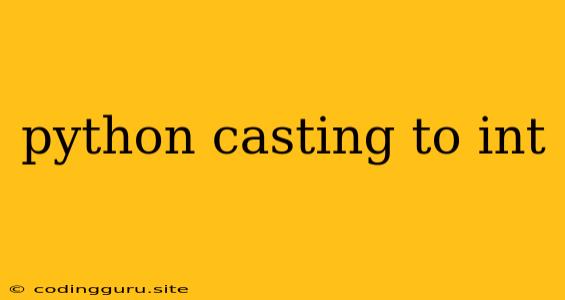Python Casting to int: A Comprehensive Guide
In the realm of Python programming, data types play a pivotal role in determining how information is stored and manipulated. One fundamental data type is the integer (int), which represents whole numbers without any fractional components. However, you might encounter situations where you need to convert data from other types to integers. This process is known as casting to int.
Why Cast to int?
Casting to int in Python is essential for various reasons:
- Mathematical Operations: Many mathematical operations, such as division, modulo, and exponentiation, require integer inputs. Casting to
intensures that your calculations are performed correctly. - Data Validation: Converting data to
intcan be used to validate user input, ensuring that only numeric values are accepted. - Indexing and Iteration: When working with lists, strings, or other iterable data structures, indexing often relies on integer values. Casting to
intis crucial for navigating these structures effectively.
Methods for Casting to int
Python provides several methods for casting data to int. Let's explore each in detail:
1. The int() Function:
The int() function is the most straightforward method for converting data to an integer. It takes a single argument, the value you want to cast, and returns an integer representation of it.
# Example 1: Casting a string to an integer
my_string = "123"
my_int = int(my_string)
print(my_int) # Output: 123
# Example 2: Casting a floating-point number to an integer
my_float = 3.14
my_int = int(my_float)
print(my_int) # Output: 3
2. The round() Function:
The round() function is primarily used for rounding floating-point numbers. However, you can combine it with int() to control how floating-point numbers are converted to integers.
# Example: Rounding a floating-point number before casting to int
my_float = 3.7
rounded_float = round(my_float)
my_int = int(rounded_float)
print(my_int) # Output: 4
3. The math.ceil() and math.floor() Functions:
The math module in Python offers functions for rounding up (ceil()) and rounding down (floor()). These functions are helpful when you need to cast a floating-point number to the nearest integer in a specific direction.
import math
# Example: Rounding up a floating-point number before casting to int
my_float = 3.2
rounded_up_float = math.ceil(my_float)
my_int = int(rounded_up_float)
print(my_int) # Output: 4
# Example: Rounding down a floating-point number before casting to int
my_float = 3.8
rounded_down_float = math.floor(my_float)
my_int = int(rounded_down_float)
print(my_int) # Output: 3
4. Using int() with Base Conversion:
The int() function can also handle conversions from different numerical bases, such as binary, octal, or hexadecimal. By specifying a second argument to int(), you indicate the base of the input value.
# Example: Converting a binary string to an integer
binary_string = "1011"
decimal_int = int(binary_string, 2)
print(decimal_int) # Output: 11
# Example: Converting a hexadecimal string to an integer
hex_string = "A2"
decimal_int = int(hex_string, 16)
print(decimal_int) # Output: 162
Considerations and Best Practices
- Type Errors: Be mindful of potential type errors. Attempting to cast a string that does not represent a valid integer will raise a
ValueError.
invalid_string = "abc"
try:
my_int = int(invalid_string)
except ValueError:
print("Invalid string for casting to int.")
-
Loss of Precision: When casting floating-point numbers to integers, you may lose precision. The decimal part will be discarded.
-
Clarity and Readability: Choose the casting method that best aligns with the desired behavior and provides clear code.
Conclusion
Mastering casting to int in Python is a valuable skill that empowers you to work with integer data seamlessly. By understanding the different methods and their nuances, you can ensure accurate data manipulation, validation, and computational efficiency in your Python projects.
